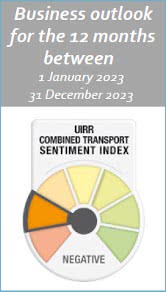
In the first quarter of this year the traffic of goods enlivened by combined transport services in Europe is decreased by -13.96% compared to the first three months of 2022. It has announced Ralf-Charley Schultze, president of the Union for Road-Rail Combined Transport (UIRR), the association that promotes transport combined in Europe, highlighting that the one recorded in the first quarter of 2023 is a decline that is only lower to the decrease of -14.67% accused in the second trimester of 2020 when mobility had been blocked to contain the spread of the Covid pandemic.
 "After a contraction of -6.46% in the last quarter of 2022 - Schultze noted - a negative second quarter consecutive means that combined transport is in a phase of temporary recession. The UIRR Sentiment Index, the index reflecting companies' valuation of next 12 months - he specified - remains "negative" The combined transport - the president of the UIRR has emphasized - is Entangled in a "perfect storm" caused by severe problems of punctuality of rail freight transport, from a shortage of train path capacity, from prices of traction electricity consistently high, from a series of high-impact strikes in France and Germany, from a weakening demand due to a strong economy slowing down together with the release of large capacity by long-distance hauliers supported by the low price of fossil fuels'.
"After a contraction of -6.46% in the last quarter of 2022 - Schultze noted - a negative second quarter consecutive means that combined transport is in a phase of temporary recession. The UIRR Sentiment Index, the index reflecting companies' valuation of next 12 months - he specified - remains "negative" The combined transport - the president of the UIRR has emphasized - is Entangled in a "perfect storm" caused by severe problems of punctuality of rail freight transport, from a shortage of train path capacity, from prices of traction electricity consistently high, from a series of high-impact strikes in France and Germany, from a weakening demand due to a strong economy slowing down together with the release of large capacity by long-distance hauliers supported by the low price of fossil fuels'.
Schultze recalled that the UIRR proposed several solutions, "All - it has specified - practicable within the current regulatory framework', to reduce the serious difficulties of the intermodal transport. Among these - he specified - "the The intermodal transport sector continues to strongly ask the Member States to use the electricity package of the European Commission, which allows immediate intervention, while Considering it necessary to address this question more closely depth, for example, with the completion of the restructuring of the continent's electricity market'.